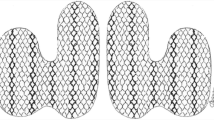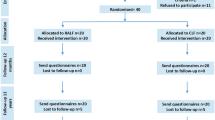Abstract
Background: Due to the widespread availability and acceptance of minimal-access surgery, laparoscopic antireflux surgery has become the standard procedure for the treatment of severe gastroesophageal reflux disease (GERD). However, open and laparoscopic antireflux procedures sometimes result in failure, so that redosurgery is required in some cases. The aim of this prospective study was to evaluate the surgical outcome and quality of life of patients who underwent refundoplication after the failure of primary open antireflux surgery. Methods: Twenty patients with a mean age of 52 years (range, 33–69) underwent laparoscopic refundoplication after primary open antireflux surgery. Four of them had undergone surgery twice previously. Preoperative and postoperative data, including esophageal manometry, 24-h pH monitoring, and assessment of quality of life, were reviewed prospectively. Quality of life was evaluated using the Gastrointestinal Quality of Life Index (GIQLI). Results: In 18 patients (90%), the reoperation was completed successfully laparoscopically. Two others (10%) required conversion to an open procedure. One of them had an injury of the gastric wall; in the other case, severe bleeding of the spleen necessitated the conversion. The average operating time was 245 min. Preoperatively, the main symptoms were recurrent reflux in 14 cases and a combination of re-reflux and dysphagia in six cases. The anatomic findings were telescope phenomenon (n = 6), hiatal disruption (n = 10), and wrap breakdown (n = 4). Postoperatively, two patients suffered from dysphagia and required pneumatic dilatation. The lower esophageal sphincter (LES) pressure increased significantly from a preoperative value of 6.08 mmHg to 12.2 mmHg at 3 months and 11.9 mmHg at 1 year after surgery. The DeMeester score decreased from a preoperative value of 69.8 to 17.1 at 3 months and 14.6 at 1 year postoperatively. The GIQLI score increased from a preoperative value of 84.9 points to 119.6 points at 3 months and 120.1 points at 1 year. Conclusion: Laparoscopic refundoplication after the failure of a primary open intervention is an effective procedure that can be performed safely by experienced laparoscopic surgeon. The procedure yields excellent functional results and leads to significant improvement in the patient's quality of life.
Similar content being viewed by others
Author information
Authors and Affiliations
Rights and permissions
About this article
Cite this article
Granderath, F., Kamolz, T., Schweiger, U. et al. Is laparoscopic refundoplication feasible in patients with failed primary open antireflux surgery? . Surg Endosc 16, 381–385 (2002). https://doi.org/10.1007/s00464-001-9102-x
Received:
Accepted:
Published:
Issue Date:
DOI: https://doi.org/10.1007/s00464-001-9102-x




